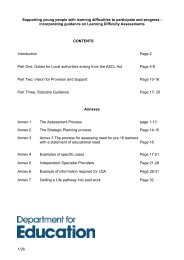Letters and Sounds 1
Letters and Sounds 1
Letters and Sounds 1
You also want an ePaper? Increase the reach of your titles
YUMPU automatically turns print PDFs into web optimized ePapers that Google loves.
<strong>Letters</strong> <strong>and</strong> <strong>Sounds</strong>: Phase Six<br />
Knowledge of the spelling system<br />
In Phase Six children need to acquire more word-specific knowledge. They still need<br />
to segment words into phonemes to spell them, but they also learn that good spelling<br />
involves not only doing this <strong>and</strong> representing all the phonemes plausibly but also, where<br />
necessary, choosing the right grapheme from several possibilities.<br />
In some cases, word-specific spellings (e.g. sea/see; goal/pole/bowl/soul; zoo/<br />
clue/flew/you) simply have to be learned. It is important to devote time in this phase<br />
to learning common words with rare or irregular spellings (e.g. they, there, said) as<br />
the quantity children write increases <strong>and</strong> without correction they may practise incorrect<br />
spellings that are later difficult to put right.<br />
However, there are spelling conventions or guidelines that generalise across many words<br />
<strong>and</strong> that children should underst<strong>and</strong>. Where there are exceptions these can usually be<br />
dealt with as they arise in children’s reading <strong>and</strong> writing.<br />
<strong>Letters</strong> <strong>and</strong> <strong>Sounds</strong>: Principles <strong>and</strong> Practice of High Quality Phonics<br />
Primary National Strategy<br />
Some useful spelling guidelines<br />
1. The position of a phoneme in a word may rule out certain graphemes for that<br />
phoneme. The ai <strong>and</strong> oi spellings do not occur at the end of English words<br />
or immediately before suffixes; instead, the ay <strong>and</strong> oy spellings are used in<br />
these positions (e.g. play, played, playing, playful, joy, joyful, enjoying,<br />
enjoyment). In other positions, the /ai/ sound is most often spelled ai or aconsonant-vowel,<br />
as in rain, date <strong>and</strong> bacon. The same principle applies in<br />
choosing between oi <strong>and</strong> oy: oy is used at the end of a word or immediately<br />
before a suffix, <strong>and</strong> oi is used elsewhere. There is no other spelling for this<br />
phoneme.<br />
Note that it is recommended that teachers should (at least at first) simply pronounce<br />
the relevant vowel sounds for the children – /a/, /e/, /i/, /o/ <strong>and</strong> /u/; /ai/, /ee/, /igh/,<br />
/oa/ <strong>and</strong> /oo/. Later the terms ‘long’ <strong>and</strong> ‘short’ can be useful when children need<br />
to form more general concepts about spelling patterns.<br />
2. When an /o/ sound follows a /w/ sound, it is frequently spelt with the letter a<br />
(e.g. was, wallet, want, wash, watch, w<strong>and</strong>er) – often known as the ‘w<br />
special’. This extends to many words where the /w/ sound comes from the qu<br />
grapheme (e.g. quarrel, quantity, squad, squash).<br />
3. When an /ur/ sound follows the letter w (but not qu) it is usually spelt or (e.g.<br />
word, worm, work, worship, worth). The important exception is were.<br />
4. An /or/ sound before an /l/ sound is frequently spelled with the letter /a/ (e.g. all,<br />
ball, call, always).<br />
00281-2007BKT-EN<br />
© Crown copyright 2007
















